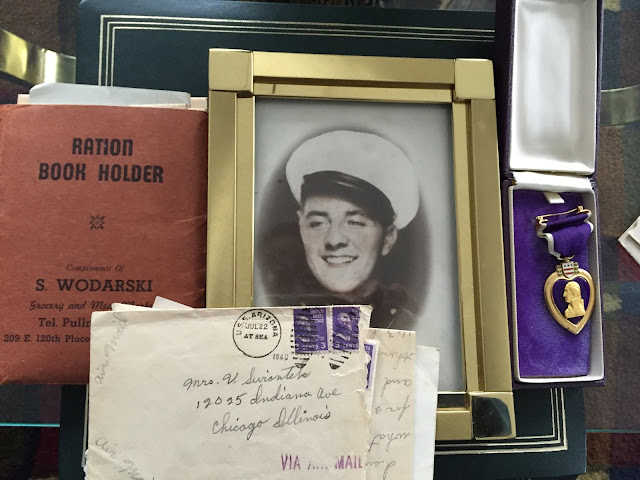
Stanley Swiontek played the clarinet, and it might have cost him his life.
The Chicagoan was a cook on the USS Arizona at Pearl Harbor which, like many ships, had a band. On Dec. 6, 1941, there was a contest, and the Arizona band came in second, earning Swiontek the right to sleep in on Sunday morning.
So when the Japanese surprise attack came, and a bomb hit the Arizona, sinking the battleship in nine minutes, Swiontek, instead of being at work and perhaps safe, was in his bunk, deep below decks.
 |
| Rick Martinotti |
Or maybe it wouldn't have mattered. Five out of six sailors aboard the Arizona died that day. Swiontek’s family never learned what happened to their Stanley. His body was never recovered — it is still entombed with 947 shipmates aboard the sunken Arizona, now a national shrine.
Franklin D. Roosevelt famously dubbed Dec. 7 "a day which will live in infamy." And it has. But 75 years is a long time. Even infamy fades. The remaining Pearl Harbor survivors — a few thousand — are in their 90s. The smallest child to hear the shock of that Sunday afternoon radio bulletin is at least 80 now.
Which is not to say that subsequent generations are untouched. For the families of those affected, the attack and the 2,403 American lives it cost resonate still, a lingering echo of love and loss.
Begin with parents like Swiontek's mother Victoria, a Polish immigrant, who saved every letter Stanley wrote home, in cursive.
To continue reading, click here.

This comment has been removed by the author.
ReplyDeleteNever forget...and it took long enough for Japan to admit to its atrocities. Some speak of our internment camps here but that was a cake walk compared to what Japan did to our POW's and other Asians. Asian History isn't studied enough in schools.
ReplyDeletePlease don't use Japan's actions as an excuse for the internment camps. "The other guy was worse" is not a moral justification for anything.
DeleteThen the PC police wonder why the moderate Democrats abandoned the Democratic party...not looking for Trump of course... but for a more centrist candidate. In the meantime the super libs can make the Democratic party into the hijacked one of "let's spank ourselves." Just as the right made the Republican party one for evangelists. What happened to the happy medium? We can expect a couple of other usual PC suspects coming out of the woodwork anytime now, though they rarely post anymore.
DeleteNonsense. Hillary Clinton was a "centrist" a candidate as one could possibly imagine. If anything, she should be considered the "happy medium" between Trump and Sanders. Even Barack Obama turned out to be more "centrist" than expected -- he is certainly to my right and I'm a 74-year-old Navy veteran and Southwest side lawyer who voted for Topinka for governor, a Democrat yes, but no radical lefty, unless you start with Ronald Reagan in the middle.
Deletejohn
To bad you can't tell that to Gen. Tojo and the high command when they put their pride before the well being of the Japanese people and didn't surrender even after the first bomb. No one said the camps here were justified.
ReplyDeletePrivate 7:16; one has nothing to do with the other.
ReplyDeleteGood column Neil. Well written. My wife and I just had a conversation about her folks' remembrances on this day. Her dad served in the Pacific and lost a brother there. Dec. 7 was not a good day for him. Her mom talked about the shock of hearing the news. By that time in the war, both my folks were slave laborers in Nazi Germany.
ReplyDeleteNo consolation for the Swiontek family, but the Japanese intended to formally declare war on the USA an hour or so before the attack -- something to the effect that a Samurai should never slaughter an enemy caught sleeping, but was honor bound to wake up the foe beforehand. However, confusion about the time differences led to the declaration being a bit late.
ReplyDeleteMy uncle was a survivor of the attack, but I didn't learn that until long after his death -- he either thought it too important to talk about or not important enough. He generally didn't talk about his experiences as a police officer either, at least not to us kids.
john
My parents were both fourteen that day, not acquainted yet, living in southern Ohio. Dad said he was getting ready for a church event and Mom was visiting with one of her close school friends, who lived a couple of blocks away. I wish I could have thought to ask my in-law parents what their memories were, in another couple of years, my father-in-law was in the Navy, after graduating from high school, serving aboard the USS New Jersey.
ReplyDeleteMy mother would lose her older brother to the war, something that especially my grandmother never quit grieving over, especially around his birthday and on the day he was lost. This story made me think of that because the Swiontek family must have done more to keep his memory alive with stories, because I know very few stories about my lost uncle.